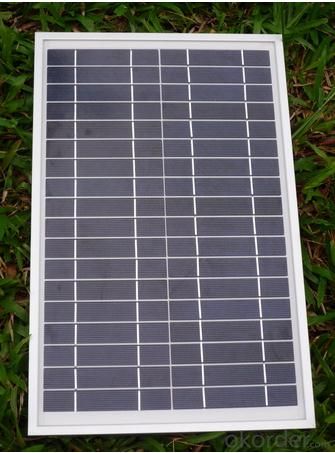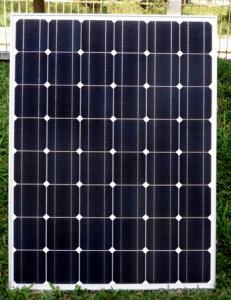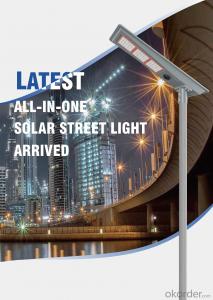106KW CNBM Monocrystalline Silicon Panel for Home Using
- Loading Port:
- Tianjin
- Payment Terms:
- TT OR LC
- Min Order Qty:
- 45 watt
- Supply Capability:
- 1000 watt/month
OKorder Service Pledge
OKorder Financial Service
You Might Also Like
Item specifice
106KW CNBM Monocrystalline Silicon Panel for Home Using
Production description
Off-the-grid homes are autonomous; they do not rely on municipal water supply, sewer, natural gas, electrical power grid, or similar utility services. A true off-grid house is able to operate completely independently of all traditional public utility services. The idea has been recently popularized by certain celebrities including Ed Begley, Jr.[1] who stars in Living with Ed[2] television show on the Home & Garden Television (HGTV) network. Actress Daryl Hannahpromotes off-grid living and constructed her home in Colorado according to those principles, as does survival expert and Dual Survival co-star Cody Lundin,[3]who lives in a self-designed, passive solar earth house in the high-desert wilderness of Northern Arizona, collecting rainwater, composting waste, and paying nothing for utilities.[4][5]
This is several times larger than the total world energy consumption, which was 559.8 EJ in 2012.
Electrical power can be generated on-site with renewable energy sources such as solar (particularly with photovoltaics), wind, micro hydro, geothermal; with agenerator or Micro combined heat and power with adequate fuel reserves. Such a system is called a stand-alone power system. In addition, it is possible to simply eliminate electric power such as in Old Order Amish and Old Order Mennonite communities.
Feature
1.High conversion efficiencies resulting in superior power output performance.
2.Outstanding power output even in low light or high temperature conditions
3.Optimized design for ease of soldering and lamination
Physical characteristic
1. Rigorous quality control meets the highest international standards.
2. High-transmissivity low-iron tempered glass, strong aluminium frame.
3. Using UV-resistant silicon.
4. IS09001/14001/CE/TUV/UL
Packaging
26pcs in one carton 6pallets in 20foot container 14pallets in 40 foot container.
- Q:Can solar energy systems be used for heating water in commercial buildings?
- Yes, solar energy systems can be used for heating water in commercial buildings. Solar water heating systems utilize the sun's energy to heat water, which can then be used for various purposes like showers, dishwashing, and laundry in commercial settings. These systems are cost-effective, environmentally friendly, and can significantly reduce energy consumption.
- Q:Can solar energy systems be used for powering telecommunications towers or antennas?
- Yes, solar energy systems can be used for powering telecommunications towers or antennas. Solar panels can be installed to capture sunlight and convert it into electricity, which can then be used to power the towers or antennas. This helps in providing a sustainable and reliable source of power, especially in remote locations where it may be difficult or costly to connect to the grid. Additionally, solar energy systems can also reduce operating costs and minimize the environmental impact associated with traditional power sources.
- Q:Can solar energy systems be used in powering hotels or resorts?
- Certainly, hotels and resorts can make use of solar energy systems to power their facilities. Solar power is a renewable and clean energy source that can effectively meet the energy requirements of these establishments. Hotels and resorts typically consume a substantial amount of energy for various purposes, such as lighting, heating, cooling, and running electrical appliances and equipment. To harness the abundant sunlight, hotels and resorts can opt to install solar panels on their rooftops or in open areas. This allows them to convert sunlight into electricity, which can then be used to power the entire facility. By doing so, these establishments reduce their dependence on traditional energy sources, resulting in a decreased carbon footprint. In addition to its environmental advantages, solar energy systems can offer financial benefits to hotels and resorts. By generating their own electricity, these establishments can significantly lower or eliminate their utility bills, leading to substantial cost savings in the long run. Furthermore, some countries provide incentives, grants, or tax credits for the implementation of solar power systems, making such installations economically viable. Moreover, the availability of solar energy is not limited to sunny days. With advancements in technology, solar panels can still generate electricity even during cloudy or overcast conditions. Furthermore, any excess energy produced during peak sunlight hours can be stored in batteries for later use, ensuring a steady power supply throughout the day and night. By adopting solar energy systems, hotels and resorts can demonstrate their commitment to sustainability and environmental responsibility. This can serve as a valuable marketing tool, attracting environmentally conscious guests who prefer eco-friendly accommodations. It also aligns with the growing trend of sustainable tourism, enhancing the reputation and competitiveness of these establishments in the industry. Overall, solar energy systems are a practical and efficient solution for powering hotels and resorts. They offer a multitude of benefits, including reduced utility costs, environmental sustainability, and increased market appeal. As technology continues to advance and become more affordable, more hotels and resorts are embracing solar power as a reliable and clean energy source.
- Q:Can a solar energy system be installed on a government building or facility?
- Yes, a solar energy system can be installed on a government building or facility. In fact, many governments worldwide are actively promoting the adoption of renewable energy sources, including solar power, in order to reduce their carbon footprint and achieve sustainability goals. By installing solar panels on government buildings, they can generate clean and renewable electricity, reduce dependence on non-renewable energy sources, and potentially save money on energy costs in the long run.
- Q:How do solar energy systems impact the local community?
- Solar energy systems can have a significant positive impact on the local community. Firstly, they contribute to a cleaner environment by reducing greenhouse gas emissions and air pollution, leading to improved air quality and public health. Additionally, solar energy systems create job opportunities, both during installation and maintenance, stimulating local economic growth. They can also reduce energy costs for residents and businesses, making energy more affordable and accessible. Moreover, solar projects often involve community engagement and education programs, which help raise awareness about renewable energy and promote sustainable practices. Overall, solar energy systems bring numerous benefits to the local community, ranging from environmental to economic and social aspects.
- Q:Can solar energy systems be installed on the ground?
- Yes, solar energy systems can be installed on the ground. In fact, ground-mounted solar systems are a popular choice for both residential and commercial applications. These systems typically consist of solar panels mounted on a structure or framework that is anchored to the ground. Ground-mounted systems offer several advantages over rooftop installations, such as increased flexibility in system design, easier access for maintenance and cleaning, and the ability to optimize the orientation and tilt angle of the panels for maximum energy production. Additionally, ground-mounted systems can be installed in areas with limited roof space or where the roof is not suitable for solar panel installation. Overall, ground-mounted solar energy systems provide a practical and efficient way to harness the power of the sun for electricity generation.
- Q:Can solar energy systems be used in all regions?
- Solar energy systems can be used in all regions to some extent. However, the effectiveness and efficiency of solar energy systems may vary depending on factors such as the amount of sunlight available, local climate conditions, and the size and orientation of the solar panels. In regions with abundant sunshine, solar energy systems can provide a significant portion of the energy needs. In regions with less sunlight, solar energy systems can still be used but may require additional support from other energy sources.
- Q:Can solar energy systems be used in areas with high levels of electromagnetic radiation?
- Yes, solar energy systems can be used in areas with high levels of electromagnetic radiation. The electromagnetic radiation from sources such as power lines or communication towers does not interfere with the functioning of solar panels. However, it is important to ensure proper grounding and shielding of electrical components to minimize any potential interference.
- Q:Can solar energy systems be used for powering agricultural machinery?
- Yes, solar energy systems can be used for powering agricultural machinery. Solar panels can generate electricity which can be used to power various farm equipment such as irrigation pumps, grain dryers, and tractors. This helps reduce dependence on fossil fuels, lowers operating costs, and promotes sustainable agricultural practices.
- Q:How do solar energy systems impact the reliability of the electricity supply?
- Solar energy systems can enhance the reliability of the electricity supply by diversifying the energy sources. These systems provide a decentralized approach to power generation, reducing the dependence on centralized power plants. This diversification helps minimize the risk of blackouts or disruptions caused by issues in the traditional electricity grid. Additionally, solar energy systems can also offer backup power during grid outages, contributing to a more resilient and reliable electricity supply.
1. Manufacturer Overview |
|
|---|---|
| Location | |
| Year Established | |
| Annual Output Value | |
| Main Markets | |
| Company Certifications | |
2. Manufacturer Certificates |
|
|---|---|
| a) Certification Name | |
| Range | |
| Reference | |
| Validity Period | |
3. Manufacturer Capability |
|
|---|---|
| a)Trade Capacity | |
| Nearest Port | |
| Export Percentage | |
| No.of Employees in Trade Department | |
| Language Spoken: | |
| b)Factory Information | |
| Factory Size: | |
| No. of Production Lines | |
| Contract Manufacturing | |
| Product Price Range | |
Send your message to us
106KW CNBM Monocrystalline Silicon Panel for Home Using
- Loading Port:
- Tianjin
- Payment Terms:
- TT OR LC
- Min Order Qty:
- 45 watt
- Supply Capability:
- 1000 watt/month
OKorder Service Pledge
OKorder Financial Service
Similar products
New products
Hot products
Related keywords





























